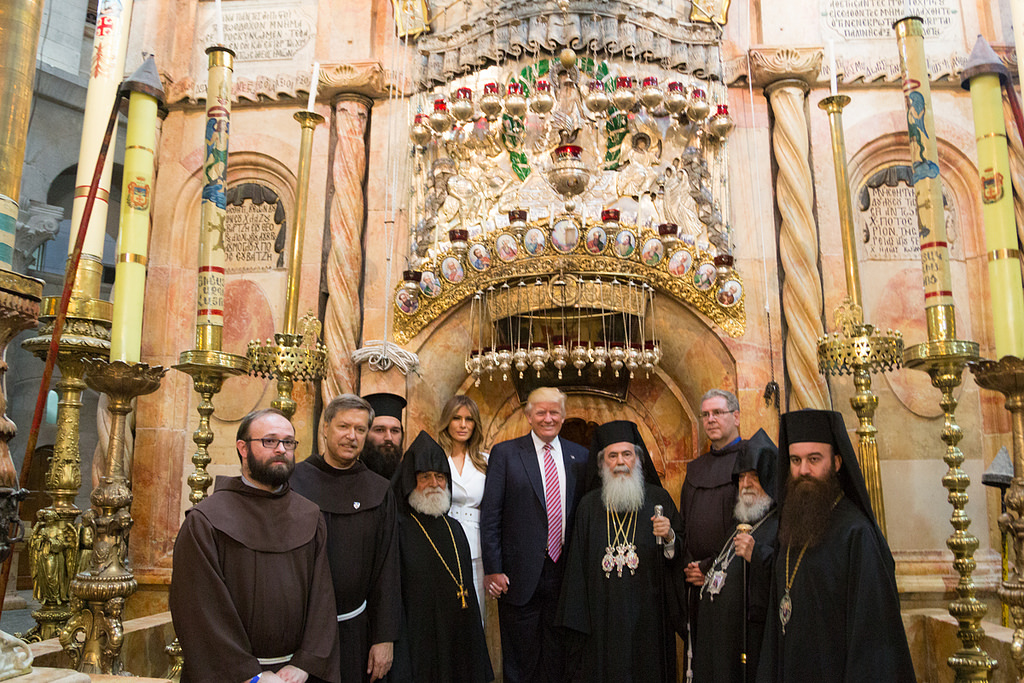Paula White, a wealthy televangelist and longtime friend of Donald Trump, has become an unlikely leader of American Christianity. The first clergywoman to pray at a presidential inauguration, White now serves as the head of Trump’s Evangelical Advisory Board, acting as his ambassador to the Religious Right. Trump and White are perfect for one another—both live lavish lifestyles, have been investigated by Congress, and exemplify a branch of Pentecostal Christianity called the “prosperity gospel.”
Unlike more traditional Christians, who believe that material success cannot be guaranteed in this life, White joins other megachurch preachers like Creflo Dollar in preaching that prosperity will come to the faithful—so long as they behave:
In this season, the people of God are going to experience unprecedented favor! Opportunities we would have never found, promotions we could have never earned, blessings we could have never worked for in years are coming our way! … I want you positioned to receive His favor—triple favor! Are you ready? God is at work, and He has chosen you for such a time as this!
Of course, to be positioned to receive His favor, one must send White a generous financial gift of $1,000 or more.

White’s 2017 Easter message (screenshot from video)
At its core, the prosperity gospel makes a promise: if the faithful play their cards right, material success will follow here and now. On the surface, the movement seems like a religious Ponzi scheme—preachers ask for money, promising impossible returns on investments. But according to Kate Bowler, a professor of the history of Christianity at Duke Divinity School, this message has a deeper appeal than just the bank account.
The prosperity gospel, Bowler told the HPR, “is an explanation for the problem of evil,” not merely a get-rich-quick scheme. No matter how often prosperity preachers are mocked by mainstream Christians, their message is nonetheless “incredibly attuned to the deepest needs of Americans in an economic system that’s radically unequal,” Bowler said. It provides answers to collective anxieties, reassuring followers that the world makes sense. White’s life is a classic rags-to-riches tale; she grew up in poverty, and tells her congregation how they too can make it out. “Out there, there are some people who have it made and others who don’t. Everyone wants to know the secret,” Bowler said. “The prosperity gospel, in Christian language, promises the secret.”
In other words, the prosperity gospel explains away luck. Good things happen because of the capitalist might of God, and bad things come to those who fail to live up to his commands. The prosperity gospel, according to Bowler, “is a language of guarantees and formulas.” It acts as a checklist of works to be done before the blessings of God can come to the faithful. In such a framework, evil cannot exist and personal responsibility reigns supreme—your faith is responsible for everything that happens to you. It’s a natural fit for any late capitalist society, marked by calcified inequality and austerity, because it explains away the deep societal problems that individuals are powerless to change.
Although his lapses in Christian ethics are well-known, Trump appeals to the same human desires as the prosperity preachers he follows. His tacky displays of wealth and many bankruptcies are selling points in the prosperity framework, rather than liabilities. They show that he was chosen, that when challenged he persevered, and that in the end he was victorious. He speaks the prosperity language too, complete with clichés and sloganeering, but also with genuine uplift and hope:
Get going. Move forward. Aim High. Plan a takeoff. Don’t just sit on the runway and hope someone will come along and push the airplane. It simply won’t happen. Change your attitude and gain some altitude. Believe me, you’ll love it up here.
Trump embodies the promise that televangelists like White hawk on their television shows. Somehow, he knows the secret.
Donald J. Trump, Theologian
Although White supposedly brought Trump to Christ, overcoming what one would imagine are substantial obstacles, the president has long been enthralled by prosperity preachers. As a boy, Trump attended Marble Collegiate Church in New York City. The congregation was led by Norman Vincent Peale, a prosperity preacher who later presided at Trump’s first wedding.
In 1952, Peale published The Power of Positive Thinking, a self-help book which stayed on the New York Times bestseller list for 182 consecutive weeks and taught a generation to pretend they do not have problems. The book has a simple message: In Peale’s words, “Think big, and you’ll achieve big results. Think success, and you’ll have success.” No matter the obstacles, no matter the depth of problem, saccharine optimism can achieve anything.
Trump has cited Peale as a critical influence, and claims that Peale thought of him as “his greatest student of all time.” Trump carries those childhood sermons with him today; as some commentators have, Peale’s self-help advice could explain the president’s tendency to lie about easily-verified facts, like crowd sizes at his inauguration. Maybe if he repeats the positive thoughts, they’ll materialize.
For at least a century, America has had two brands of public theologian. One is the respectable academic, such as Reinhold Niebuhr, who achieves public fame for intellect and high-minded calls for peace. They constitute the “God-is-love” school, famous for its support of the Civil Rights Movement and abolition. The other, widely panned or ignored by Catholics and mainline Protestants, are the prosperity preachers.
With their fingers on the pulse of American civil religion, these preachers represent the underbelly of churchgoing which politicians were reluctant to endorse—until Trump, politicians courted voters in prosperity megachurches but never got too close to the preachers. That would have been political suicide since traditional evangelicals hate the prosperity gospel—right-wing commentator Erick Erickson called White “an actual Trinity-denying heretic.” But despite this traditional opposition, American pop culture echoes prosperity gospel all the way down. The Power of Positive Thinking is just one of many bestselling pseudo-Christian books lining the self-help aisle.
The American love of prosperity gospel has a long history. In his 1902 book Varieties of Religious Experience, Harvard psychologist and philosopher William James dedicates two of his 20 lectures to “The Religion of Healthy-Mindedness.” The lectures consider people like Mary Baker Eddy, the founder of the faith-healing Christian Scientists, who believed, in the words of James, that “evil is simply a lie, and any one who mentions it is a liar.”
Peale echoed this sentiment half a century later. When Neibuhr criticized The Power of Positive Thinking for offering “not a genuine denial of evil but rather a horror of it,” he failed to understand that denial is a feature of the prosperity gospel, not a bug. It is a theology of aversion, relentless smiles and positivity—the Wal-Mart of faith. James called it America’s “only decidedly original contribution to the systematic philosophy of life.”
Today, that contribution is seen throughout the developing world, an artifact of colonialism prevalent especially in sub-Saharan Africa and Latin America. One Nigerian was quoted in the BBC saying that this ideology gained prominence in his country “as a result of poverty, social and economic collapse.” Regions with a great deal of privatization and enormous inequality seem to be crawling with prosperity preachers.
The prosperity gospel may be exploitative, but it offers the profound hope that the individual has the power to change their life. To Bowler, Trump’s appeal fits soundly in this tradition. His relentless focus on positive thinking and material success gets at the heart of the prosperity gospel. “Theologically, [the prosperity gospel] taps into the American civil religion, which adds a pair of supernatural bootstraps so that any right-thinking, right-believing, right-acting person can rise to the top,” Bowler told the HPR. “In that way, Donald Trump, even though he’s not very theologically sensitive or even much of a churchgoer, will manage to capture much of the essence of what the prosperity gospel has to offer.”
Peale once said, “We have made the mistake of thinking that Christianity is a creed to be recited. On the contrary, it is a power to be tapped.” In an outcome-driven culture propelled by language of self-reliance, “bootstraps,” and the American Dream, it is little wonder that Peale’s philosophy now sits in the White House.
Fox News Considers the Meaning of Life
Much like the prosperity gospel, Trump’s appeal goes deeper than wallets. Simple narratives about Trump’s base—it is composed of people who were “left behind” economically, for example—paint over the complicated desires that motivated his supporters. After all, the average Trump supporter is wealthier than the average American, and did not vote for Trump for economic reasons, at least not exclusively. They voted for a compelling narrative, a solution to the problem of evil, where God’s favored businessman comes to fix a hopelessly broken system.
Unlike the Religious Right, prosperity preachers were fairly nonpartisan before 2016—White preaches to a largely black congregation in Florida. But there is little cable-watching Americans love more than their televangelists—many of whom teach the prosperity gospel—and the madness of primetime Fox News; their overlapping viewership was a hidden voting bloc waiting to be unleashed. Like St. Thomas Aquinas eying Aristotle and the Medieval church, Trump saw America was hungry for a neo-Scholastic fusion of right-wing politics and prosperity theology.
When Fox News first emerged in 1996, it instantly filled a vacuum in American media. Unlike other news outlets, which more-or-less reported stories with little narrative arc, Fox News delivered 24/7 right-wing viewpoints directly into your home. Roger Ailes, the longtime conservative operative who founded the network, built it explicitly for this purpose. The network delivers more than news—it provides its viewers with a complete worldview.
Political propaganda works for precisely the same reason the once-apolitical prosperity gospel does: it is a solution to the problem of evil. In propaganda, all bad in the world is caused by a few stock villains, and all good from a few vague virtues. Trump’s fusion of prosperity rhetoric and Fox was a natural one.
The prosperity gospel promises that good people will be rewarded and bad people will be punished. Trump’s genius was to redefine “good” and “bad” following the Fox News framework, extending the work of the televangelists. In his world, Muslims are bad, “illegals” are bad, hard-working rich people are good, “snowflake” liberals are bad, and so on. These definitions are easy, because whoever does not fit into the rosy bootstrap picture of Norman Vincent Peale or the politics of Sean Hannity automatically goes in the “bad” pile. As the nation becomes increasingly polarized, narratives like this become easier to create.
“Every president has to promise a mechanism by which the world can be made fair,” Bowler told the HPR. The White-Hannity fusion, never-before-seen-on-television, is what it means to Make America Great Again. By combining one of the country’s most popular religious movements with what was its most popular news network, Trump became a right-wing populist in unusual sync with voters. His world-made-fair builds on the individualist system of the prosperity gospel and the nostalgia of the right, fusing two branches of the American id into one powerful movement. Trump built one of the most compelling narratives in modern politics—all he had to do was watch TV.
Image Credit: Shealah Craighead/The White House
